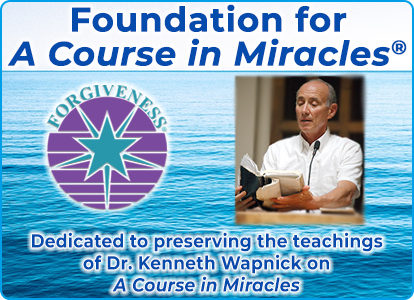
Click on an excerpt, audio or video tab to open.
Click on an excerpt, audio
or video tab to open.
Best Viewed in Landscape
Q: Do you think that there are some “contraindications” to practice exercises of the workbook year after year, continually? Do you know for example, if Bill or Helen had a specific practice of the 365 exercises constantly?
A: There may or may not be contraindications. It depends entirely on the purpose of repeating the lessons year after year. There is no right or wrong way to do the workbook, other than to do the lessons in order, as Jesus instructs us. Some people find it helpful to do the lessons over and over, but it is not necessary to do them more than once. It probably is a good idea to go back over them in order to study what they teach, but it is not necessary to do the exercises more than once, unless that is your guidance. Each person is guided individually, as we know.
A red flag to be alert to is developing a dependency on the lessons. For example, if you find that you cannot start the day without doing a lesson, or you find yourself empty or depressed if you don’t do a lesson every day, year after year, then you know that you have formed a special relationship with the workbook. That is something you would want to look at, because the ego has more than likely jumped in and joined the process, and you will miss the essence of what the lessons are about.
Another thing to watch for is the need to keep doing the lessons until you do them perfectly. That, too, would be coming from your ego. It is far more in keeping with the spirit of the workbook, and Jesus’ gentle guidance of us, to do the lessons “badly” and then forgive yourself for forgetting or falling asleep, or whatever. The middle of Lesson 95 explains that it is much more helpful to approach the lessons that way, because that would reflect the bottom line of what we are learning, which is to remember not to take the “tiny, mad idea” seriously. That clearly is the way Jesus would like us to proceed.
The training largely involves our getting in touch with our resistance and fear of going ahead with the process of disidentifying with our ego. A little willingness is all that is ever asked. All that is important is that we would want to think of God or Jesus during the day. Remembering to say all of the statements exactly on time each day is not the point. That we would want to, though, is the point, regardless of whether we successfully complete all of the instructions as directed. The content, not the form, is what we should aim at. And the content is the forgiving love of Jesus.
Helen and Bill did the lessons together once; then they did them again with Ken Wapnick; and finally Helen, Bill, and Ken did them with Judy Skutch, at her request.
Excerpted from Q&A
Q: A problem that will not go away, no matter what I do, concerns evil in people in my life: abuse, neglect, selfishness. I want to forgive, but in all honesty I cannot, because inside I am angry and I hate evil. Prayer gives me lots of affirmation of love. I want this love from people. I am also afraid of people. How can I pass through this wall that obstructs my peace?
A: This type of situation is usually difficult to work through. It requires a great deal of patience and gentleness with yourself. Forgiveness, of course, never means that you deny the “objective facts”—the abuse, neglect, and selfishness. It asks that you bring your anger and your feelings of victimization to the loving, non-judgmental presence within you, and just observe yourself holding others responsible for your lack of peace. If you try to forgive when you really don’t want to, you are fighting yourself and you will wind up feeling more guilty, which is not a kind thing to do to yourself. Holding on to blame and anger is not sinful and has no effect on Jesus’ love for you; it just prevents you from being peaceful and experiencing that love, as you already know. That is all.
When you are in touch with your feelings about evil, you might remember Jesus’ advice to us concerning the original choice to separate ourselves from God: “Call it not sin but madness, for such it was and so it still remains. Invest it not with guilt, for guilt implies it was accomplished in reality. And above all, be not afraid of it” (T-18.I.6:7-9). If you hate evil, you are afraid of it and have forgotten that when love looks on it, it sees only a tiny, mad idea having no power to affect love in any way. That means that the truth about you has been untouched by what you have perceived as evil in others. The part of you that is afraid of that truth continues to see evil as real and powerful, and capable of making you weak.
Finally, a therapist or counselor might help you recover some of your inner strength and work with you on your fear of relationships. You could then look at the deeper issues and apply the principles of A Course in Miracles.
Excerpted from Q&A
AUDIO
Press play arrow to listen.
Excerpted from Art and A Course in Miracles: Reflections of Holiness
AUDIO
Press play arrow to listen.
Excerpted from Art and A Course in Miracles: Reflections of Holiness

